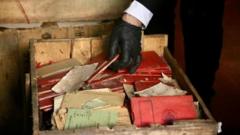Article Text:
Crates containing historically significant documents from Nazi Germany have been discovered in the basement of Argentina's Supreme Court, shedding light on the country's past during World War II. This unexpected find occurred as workers were preparing to relocate the building's archives to a new museum dedicated to historical records.
The boxes in question were originally sent from the German embassy in Tokyo, arriving in Argentina on June 20, 1941, inside 83 diplomatic pouches aboard a Japanese steamship. The documents were confiscated by Argentine customs after officials opened several pouches at random, discovering Nazi propaganda within.
The discovery happened recently when workers stumbled upon several wooden crates, initially thought to be champagne containers, while handling archival materials. Upon inspection, the contents revealed materials aimed at promoting Adolf Hitler’s ideology in Argentina during the war period.
Following the find, the crates were secured in an office within the courthouse, and court officials reached out to the Buenos Aires Holocaust Museum for assistance in documenting the materials. Among the items were vintage photographs, membership booklets adorned with swastikas, and various Nazi-era propaganda.
Historians are eager to analyze the documents for insights into the financial and international networks of the Nazis. Argentina's Supreme Court has disseminated preliminary findings, noting that the documents had been labeled as “personal effects” upon their arrival in Buenos Aires. However, customs raised suspicions over the pouches' contents, alerting government officials as the country maintained a neutral stance during the conflict.
Initially, the German embassy attempted to retrieve the pouches, but Argentine authorities, concerned about national security, decided to keep them in 1941. It took until 1944 for the Supreme Court to address the matter, and by then, Argentina had severed ties with the Axis powers, resulting in the documents being left untouched for decades.
Following World War II, Argentina became a refuge for several high-ranking Nazi officials, including infamous figures like Adolf Eichmann and Josef Mengele. In 2000, former President Fernando de la Rúa formally apologized for Argentina's role in sheltering war criminals, and this recent document discovery may further illuminate the historical context of that era.
Crates containing historically significant documents from Nazi Germany have been discovered in the basement of Argentina's Supreme Court, shedding light on the country's past during World War II. This unexpected find occurred as workers were preparing to relocate the building's archives to a new museum dedicated to historical records.
The boxes in question were originally sent from the German embassy in Tokyo, arriving in Argentina on June 20, 1941, inside 83 diplomatic pouches aboard a Japanese steamship. The documents were confiscated by Argentine customs after officials opened several pouches at random, discovering Nazi propaganda within.
The discovery happened recently when workers stumbled upon several wooden crates, initially thought to be champagne containers, while handling archival materials. Upon inspection, the contents revealed materials aimed at promoting Adolf Hitler’s ideology in Argentina during the war period.
Following the find, the crates were secured in an office within the courthouse, and court officials reached out to the Buenos Aires Holocaust Museum for assistance in documenting the materials. Among the items were vintage photographs, membership booklets adorned with swastikas, and various Nazi-era propaganda.
Historians are eager to analyze the documents for insights into the financial and international networks of the Nazis. Argentina's Supreme Court has disseminated preliminary findings, noting that the documents had been labeled as “personal effects” upon their arrival in Buenos Aires. However, customs raised suspicions over the pouches' contents, alerting government officials as the country maintained a neutral stance during the conflict.
Initially, the German embassy attempted to retrieve the pouches, but Argentine authorities, concerned about national security, decided to keep them in 1941. It took until 1944 for the Supreme Court to address the matter, and by then, Argentina had severed ties with the Axis powers, resulting in the documents being left untouched for decades.
Following World War II, Argentina became a refuge for several high-ranking Nazi officials, including infamous figures like Adolf Eichmann and Josef Mengele. In 2000, former President Fernando de la Rúa formally apologized for Argentina's role in sheltering war criminals, and this recent document discovery may further illuminate the historical context of that era.


















